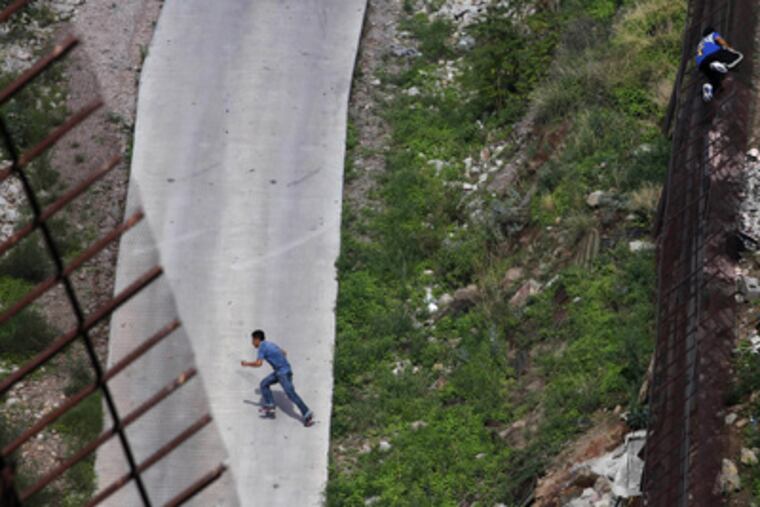Arizona law will be upheld
The U.S. Supreme Court did not have to commit itself, as it did Monday, to deciding the constitutionality of Arizona's anti-illegal immigration statute, Senate Bill 1070. The justices could have allowed the lower federal courts, which have temporarily enj

The U.S. Supreme Court did not have to commit itself, as it did Monday, to deciding the constitutionality of Arizona's anti-illegal immigration statute, Senate Bill 1070. The justices could have allowed the lower federal courts, which have temporarily enjoined enforcement of portions of the law at the request of the Obama administration, to proceed with a trial on the statute's constitutional merits. Or they could have waited until lower courts ruled on challenges to similar statutes in Alabama, South Carolina, Oklahoma, and Georgia.
The Obama administration had urged the Supreme Court to hold off weighing Arizona's defense of its law even as the administration proceeds with challenges against similar laws of other states. But the Supreme Court refused. It agreed to resolve the ongoing dispute over state and local enforcement of federal immigration laws, and to do so promptly, in the midst of a presidential election campaign.
Both my parents were immigrants. I respect and admire immigrants. But the issue here is numbers. Should there be a limit on immigration or not? It's a binary choice.
For the first hundred years of the republic, we had no such limit. If Congress wanted to, it could declare the borders open and welcome all comers. Instead, it has chosen to allow about a million legal immigrants every year to enter with a clear path to full citizenship - the most generous immigration policy in the world.
To enforce its limitation, Congress authorized deportation of aliens unlawfully present. It established criminal penalties for aliens who enter illegally, or who fail to register with the government, or who fail to have proper documentation in their possession. Criminal penalties have also been enacted by Congress for the knowing employment, transporting, or harboring of illegal aliens.
Arizona wouldn't need S.B. 1070 if the Obama administration was committed to enforcing U.S. immigration law. Unable to get through Congress the amnesty it advocates for illegal aliens, the administration has announced a policy of "prosecutorial discretion" under which the only illegal aliens targeted for removal are those convicted of crimes or deemed a national security threat.
Arizona has more than 350 miles of sparsely populated international border. Since effective border fencing was installed in the adjoining San Diego and El Paso sectors, Arizona has become the main entryway for illegal border-crossers. The Obama administration has been trying to have things both ways: recognizing a limit on immigrants, but not enforcing it. Arizona can't wait.
In enacting S.B. 1070, Arizona assisted the federal government in enforcing its own immigration laws. Federal law specifically authorizes any officer of a state or locality to cooperate with the federal government "in the identification, apprehension, detention, or removal of aliens not lawfully present in the United States." Federal law also requires that the federal government respond to any inquiry by a state or local government agency "seeking to verify or ascertain the citizenship or immigration status of any individual within the jurisdiction of the agency for any purpose specified by law."
As one U.S. appeals court observed in 1999, "This collection of statutory provisions evinces a clear invitation from Congress for state and local agencies to participate in the process of enforcing federal immigration laws."
S.B. 1070 is Arizona's attempt to accept that invitation by requiring its officers to verify the immigration status through the federal government of any person lawfully stopped who is reasonably suspected of being an illegal alien. The statute makes illegal under Arizona law what is also illegal under federal law, the failure of an alien to carry immigration documents. Similarly, it makes illegal under Arizona law the solicitation for work, transporting, or harboring of a known illegal alien, actions also illegal under federal law.
Because S.B. 1070 is consistent with and not in conflict with federal immigration law, Arizona asserts that it must be upheld as constitutional.
The Supreme Court this year has upheld the constitutionality of an Arizona statute that revokes the business license of any employer who knowingly hires illegal aliens, and has vacated the decision of Philadelphia's U.S. Court of Appeals for the Third Circuit that enjoined enforcement of the anti-illegal alien ordinances of Hazleton, Pa.
Oral arguments on S.B. 1070 should occur by April. A decision is expected by June. If it is split, in the middle of a presidential election campaign, that ruling will underscore the importance of the Supreme Court and the power that lies in being the one to fill future vacancies. With Justice Elena Kagan recusing herself, I predict a 5-3 majority upholding S.B. 1070.